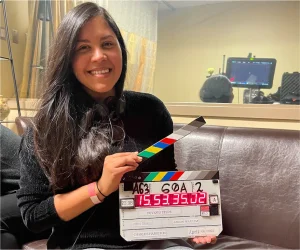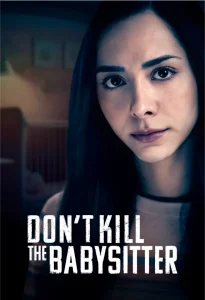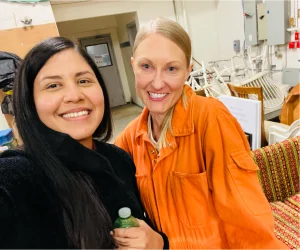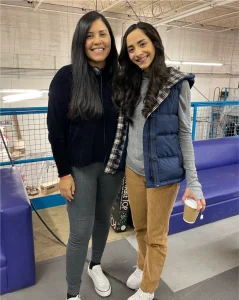Mariannjely Marval is a recent Film Connection graduate who sold her first screenplay ever to the LifeTime network. I interviewed her about this success back in March, and decided to sit down with her again, post-premier of her debut film, Don’t Kill the Babysitter, to discuss both the movie and her plans for the future.
I found out about the premiere just three days before; it was pretty sudden. I gave my close friends a heads-up and let my former host family in on it too. I pulled something together at home with my family. I happened to be visiting them in Texas at the time, so it worked out perfectly. It was a lovely night, messaging with my mentor, Richard Brandes, friends, and even face-timing my host family while watching. Now, my family in Texas doesn’t speak English, so during every single commercial break, I was their translator. But even though they didn’t catch all the details, they got the basics of what went down. Regardless, having them right there with me, witnessing my achievement, meant the world. And let’s not forget the “written by” credit – an absolutely incredible moment.
It was on TV, aired on the LifeTime Movie Network. The interesting part is that most of the team is from Canada, so they had to do some digging to figure out how to watch it. We were so excited to finally see it on TV!
Absolutely! I didn’t set specific expectations, really. Writing the script was so fun, just imagining everything in my head. When I saw the director Chris Bragg’s take on it, I was smitten. Seeing those mental images come to life was so cool. A bunch of moments matched exactly how I’d pictured them. It was surreal! Special shoutout to Charles Hamilton as well, the talented DP.
That’s very kind. I was open to seeing how the director interpreted things, as well. I loved seeing his personal spice and the things he added. It’s a collaborative art after all.

The original name was A Perfect Match, once we went into pre-production it was changed to Devious Deeds. We did all the pre-production work under that title. I believe the network ultimately chose Don’t Kill the Babysitter. It is fun and straight to the point…. I wish it was Au Pair instead of babysitter, but they use Au Pair in the description, so it’s still accurate.
A little mouthful but I can roll with it, haha.
There were about three rewrites before production started. Some changes happened during filming, but the essence of the script was there.
THE NEXT SECTION OF THE INTERVIEW CONTAINS SOME *SPOILERS,* AND YOU MAY WANT TO WATCH DON’T KILL THE BABYSITTER BEFORE CONTINUING.

My thing is exploring the young immigrant experience, giving it a new twist. I’m all about showing a different side. You know, there’s already a bunch of movies all about the political stuff, the downsides. I wanted to spotlight a young foreign girl coming to the US with dreams, and how fast those dreams can turn into nightmares. Often [in the media] Latinos are portrayed as the ones who come to do something wrong, and I wanted to flip that. The reality is not black and white; we are all capable of things, and there is danger everywhere.
It’s about equality. It shouldn’t matter if you come from another country or another disadvantaged social position, we all have the same [intrinsic] value. A better social position doesn’t mean your life is worth more.
The actress who played her, Dawn Nagazina, was amazing. She was able to go into that deeper level that I wanted that character to be. That character is conflicted the whole time. She’s caught up in this major dilemma – choosing between staying with her beloved daughter and husband or taking a morally questionable path. She’s losing hope and is desperate. She makes you question, “If I were in her position, would I do the same? Would I do this for myself? For my kid?”

That was a great surprise, actually. In the script, we had this secret door in Chase’s office. But when I was on set during the final weekend of shooting, the director was pumped to tell me that the location had an elevator. Sometimes, these fantastic details emerge during production. I love what Chris did with it!
The very first version actually had a love interest. I love romance. But the love aspect distracted from the horror. Eventually, I had to kill the love interest and keep her friend character only. That’s the process when getting feedback and collaborating with the production team.
When I moved to the US as an Au Pair, I was definitely naive and innocent. Mariela kinda mirrors me in that way. I borrowed the start of my story, but she’s way stronger than I ever was. In her shoes, I would’ve been an easy target. Fortunately, my experience turned out differently, and I ended up with the absolute best host family, whom I still adore to this day.
I wanted to use the belief that it’s very rough in Venezuela-which it can be. She’s a character that’s had to fight in her life. She knows how to protect herself. There’s also an irony that she was originally selected because she’s fit, strong, and healthy. She’s got a great heart… in every sense.
Valentina Andrade did an incredible job as Mariela. To begin with, I was thrilled to see a Latina taking on the role. And when I got to the set, you could instantly feel the love everyone had for her. She’s a powerhouse. Meeting her was a real highlight. We actually had a chance to sit down, and she shared that this was her first lead role, expressing how exhilarating it was for her to read the script. That’s exactly what it’s all about – paving the way for folks like me and seeing our faces on the screen. Representation truly makes a difference.

I didn’t really think of those as microaggressions. I wanted Lori to be extra accommodating, probably out of guilt. They’re genuine folks, desperate in their own ways. Chase, the dad character, just operates with a different mindset than Lori, so he’s more straightforward and determined.
I have a couple meetings coming up with managers. Obviously, with the WGA strike things are slow, and I’m being careful about what I can do. I am writing a few scripts that are ready to pitch when the time is right. I’m exploring both myself as a writer and the genres I like to write. It’s my first credit, and I can use it as leverage. I’m excited for the next one. It was an amazing opportunity that I’ll forever be grateful to my Film Connection mentor, Richard Brandes.
I’m all for more diverse voices, new stories. Let’s get fresh perspectives out there, stuff we haven’t seen in the media. To anyone reading this, take chances and share your story. Everyone’s got a story worth telling. Don’t hold back – go for it. I’m rooting for more underrepresented voices on the big screen. We are the ones to tell our stories.
Since graduating the program in 2021, Mariannjely Marval has continued to work with her mentor, Richard Brandes. Their collaborative script, Devious Deeds, hit the market, was quickly optioned, and is soon to be released as a feature length film!
I used to be an actress. Acting was what I thought I wanted to do, but [I realized screenwriting] is what I’m meant to do. I’ve found so much more freedom and creativity in writing. Having a background in acting really helps with my writing.
I feel my characters. I live my characters. As an actor, when you get a script, you have to create your character’s background [based on clues from the writer]. My script has extra help built-in for the actors. I try to give more information for the actors to prepare with. I tend to act in my head [as I write]. I’m generally the protagonist, and it helps me put my heart into the script.
Absolutely! Funny enough, I can get nightmares. If I’m working on a thriller I get so into the story that I will have dreams. Sometimes it gives me ideas. I will wake up and be like, “That dream was cool! I’m going to go with that.”
I’m not the most organized person. I have to rework my outlines immensely in order to show them to someone else. They make total sense to me, but not to anyone else. They are based on a few images and words and intents. I’m a little all over the place… but I understand my own madness.
I’m not an American, I’m from Venezuela. I have an immigrant point of view, and that’s my focus. The story and message I want to tell. I put my voice into the protagonist. For my secondary characters, though, I do a ton of research. I exchange material [with American writers in order to nail American character’s voice]. I want to make sure everyone’s voice is [natural].
Devious Deeds is the project I developed with Richard Brandes and Film Connection. Richard said, “Give me three ideas you’re passionate about and write something that you know.” My strategy was to take a world I’m familiar with and then get creative. I was an au pair myself [when I first came to the United States]. I remember all the fears I had as an immigrant going to live with a family I’ve never met. I brought it to Richard and that’s how it was born.
It centers around an immigrant au pair who travels to the U.S. to live with a picture-perfect family. Little by little, she sees that things aren’t as they seem. She discovers that the family has a different motive for inviting her to live with them.
It has nothing to do with my experience. I actually made a phone call to my host family after the script got optioned. I was like, “This is happening, but just so you know, this is not based on you. I had a great experience. It was the best year of my life.” This is a “what could have been” story.
You are in another country. I had no family or friends. I was in a position where, if things went wrong, [they could go very wrong]. I wanted to [encapsulate] that anxiety. With my scripts I like to face my own personal fears… in horror that is, I also write romcoms.
Life is a balance and I live in that balance. My life is not a horror movie, nor is it a romcom. They both let me travel to a different world. I have so much fun writing a horror where everything goes completely wrong, and then turning around and writing a romcom where everything goes magically right. I like the opposites. I usually have to write a romcom after a horror movie, in order to come out from the darkness. It brings me back. If I were to just write horror, it would start getting to me, I’d have way too many nightmares.
I love this question. I had the insecurity that, “I’m in such a different position. Why would my voice be relevant? How can I compete with an American writer?” More than ever there is a curiosity about [diverse] cultures. All my immigrant friends–we want to see ourselves on TV. Everyone wants to feel part of something… feel like they belong. I understood my mission. As an actress [the lack of representation was frustrating] but as a writer, I can start telling those stories, and create opportunities for people like me.
The problem isn’t always being underrepresented, but misrepresented. I saw that there was a need to start writing our own stories. I realized I was so much more powerful than I thought. [My language] might be a disadvantage, but my perspective is [important and compelling].
Minority communities have so many stories to tell, from our perspective. There are universal themes that everyone can relate to, but your unique voice is your superpower.
Yea, I mean, I love that movie. It was so fun. Such a huge deal that it got the relevance that it did. It came from the hearts of diverse people.
I do learn a little more about me with every script. They definitely are a form of therapy. Things that happen in my daily life show up in my script, [and sometimes] I start questioning, “Why are you so interested in that?” They give me a greater understanding of myself and the world.
During the pandemic, like many others, I was saying to myself, “What is the next thing? What is my calling?” I always liked to write, and I always wrote in Spanish. I had a background in theater and would write plays. It was a way for me to express myself… I never felt that I was very good at expressing myself verbally. Screenwriting was always in the back of my mind. I started doing research and I found Film Connection online. I was like, “This is great. I can do this from home during the pandemic. I can have this connection to Los Angeles without being there.”
My mentor is Richard Brandes. I guess I said “is” because I still think of him as my mentor. It’s been a couple of years and we still talk. He’s just such a great person to work with. I was matched with him through Film Connection and I felt so lucky! His background is so impressive, I love all of his movies. I put in extra work and he saw it. He gave me so much reassurance. As an immigrant and a non-native English speaker, I have so much insecurity. It’s not just writing a script, it’s writing it in another language. He said to me, “You’re good! I understand you!” He was my biggest fan. He helped me so much. The fact that he believed in my work, ideas, and abilities allowed me to believe in myself. I’ll be forever grateful to him and Film Connection.
Yes! DO IT! You will not regret this. Regardless of the outcome. I got so lucky. My project got produced. I’m so proud of it. My very first script. But even if that didn’t happen for me, I learned so much during this time. This connection you get with someone who is already in the industry is such a great opportunity. You have to take advantage of it, work hard, and maintain a good relationship with your mentor. But no matter what you are going to come out of it a better writer, a better filmmaker. It could be the beginning of something wonderful.
Fill out the form to contact admissions and learn about your opportunities.

"*" indicates required fields
*Not all programs are available in every state. Consult an Admissions Representative to learn more.





Film Connection © 2025 | All Rights Reserved | Built with 💙 by DesignTork